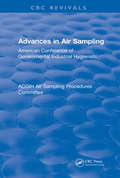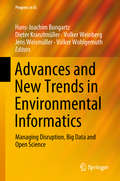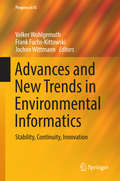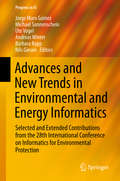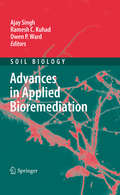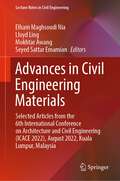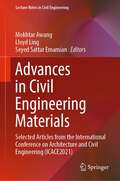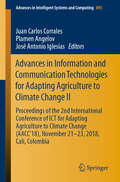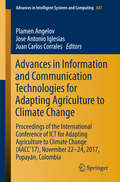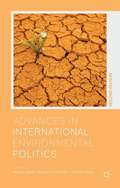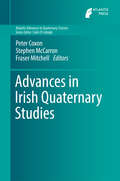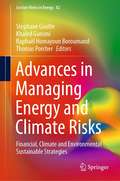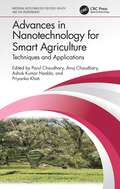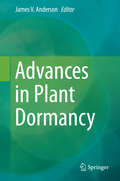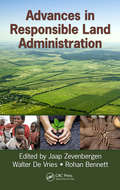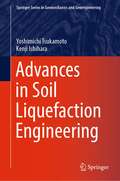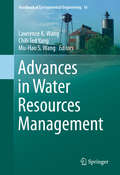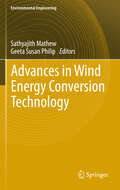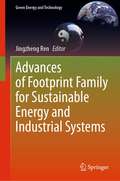- Table View
- List View
Advances In Air Sampling: American Conference of Governmental Industrial Hygienists (CRC Press Revivals)
by American Conference of Governmental Industrial HygienistsA copublication of the American Conference of Governmental Industrial Hygienists and Lewis Publishers, this series continues the former Annuals of the American Conference of Governmental Industrial Hygienists. This series is designed to present state-of-the-art information on research and practical applications of science in the field of occupational health. Bokos are normally the proceedings of an important symposium or conference sponsored by the ACGIH or other leading professional organization in, or allied with, the occupational health field. Content deals with subject of current interest. Books in the Industrial Hygiene Science Series should become valued additions to the international scientific literature. Published volumes in this series are: Microcomputer Applications in Occupational Health and Safety Ergonomic Interventions to Prevent Musculoskeletal Injuries in Industry Advances in Air Sampling.
Advances and New Trends in Environmental Informatics: Managing Disruption, Big Data and Open Science (Progress in IS)
by Hans-Joachim Bungartz Volker Wohlgemuth Dieter Kranzlmüller Volker Weinberg Jens WeismüllerThis book presents the latest findings and ongoing research in the field of environmental informatics. It addresses a wide range of cross-cutting activities, such as efficient computing, virtual reality, disruption management, big data, open science and the internet of things, and showcases how these green information & communication technologies (ICT) can be used to effectively address environmental and societal challenges. Presenting a selection of extended contributions to the 32nd edition of the International Conference EnviroInfo 2018, at the Leibniz Supercomputing Centre in Garching near Munich, it is essential reading for anyone looking to expand their expertise in the area.
Advances and New Trends in Environmental Informatics: Stability, Continuity, Innovation (Progress in IS)
by Jochen Wittmann Volker Wohlgemuth Frank Fuchs-KittowskiThis book presents the latest findings and ongoing research in the field of green information systems as well as green information and communication technology (ICT). It provides insights into a whole range of cross-cutting concerns in ICT and environmental sciences and showcases how information and communication technologies allow environmental and energy efficiency issues to be handled effectively. Offering a selection of extended and reworked contributions to the 30th International Conference EnviroInfo 2016, it is essential reading for anyone wanting to extend their expertise in the area.
Advances and New Trends in Environmental and Energy Informatics: Selected and Extended Contributions from the 28th International Conference on Informatics for Environmental Protection (Progress in IS)
by Andreas Winter Jorge Marx Gomez Michael Sonnenschein Ute Vogel Barbara Rapp Nils GiesenThis book presents the latest findings and ongoing research in the field of green information systems and green information and communication technology (ICT). It provides insights into a whole range of cross-cutting topics in ICT and environmental sciences as well as showcases how information and communication technologies allow environmental and energy efficiency issues to be handled effectively. The papers presented in this book are a selection of extended and improved contributions to the 28th International Conference on Informatics for Environmental Protection dedicated to ICT for energy efficiency. This book is essential and particularly worth reading for those who already gained basic knowledge and want to deepen and extend their expertise in the subjects mentioned above.
Advances in Applied Bioremediation (Soil Biology #17)
by Ajay Singh Ramesh C. Kuhad Owen P. WardBioremediation is a rapidly advancing field and the technology has been applied successfully to remediate many contaminated sites. The goal of every soil remediation method is to enhance the degradation, transformation, or detoxification of pollutants and to protect, maintain and sustain environmental quality. Advances in our understanding of the ecology of microbial communities capable of breaking down various pollutants and the molecular and biochemical mechanisms by which biodegradation occurs have helped us in developing practical soil bioremediation strategies. Chapters dealing with the application of biological methods to soil remediation are contributed from experts - authorities in the area of environmental science including microbiology and molecular biology - from academic institutions and industry.
Advances in Citrus Nutrition
by Anoop Kumar SrivastavaThis is a solitary attempt to streamline all the possible information related to citrus nutrition, with emphasis on diagnosis and management of nutrient constraints, employing a variety of state-of-art techniques evolved globally over the years . While doing so care has been taken to include peripheral disciplines so that the discussion becomes more lively and authoritative. An entire array of exclusive subjects has been nicely portrayed with the help of latest data and photographs.
Advances in Civil Engineering Materials: Selected Articles from the 6th International Conference on Architecture and Civil Engineering (ICACE 2022), August 2022, Kuala Lumpur, Malaysia (Lecture Notes in Civil Engineering #310)
by Mokhtar Awang Seyed Sattar Emamian Lloyd Ling Elham Maghsoudi NiaThis book presents selected articles from the 6th International Conference on Architecture and Civil Engineering 2022 (ICACE 2022), held in Malaysia. Written by leading researchers and industry professionals, the papers highlight recent advances and addresses current issues in the fields of civil engineering and architecture.
Advances in Civil Engineering Materials: Selected Articles from the International Conference on Architecture and Civil Engineering (ICACE2021) (Lecture Notes in Civil Engineering #223)
by Mokhtar Awang Seyed Sattar Emamian Lloyd LingThis book presents selected articles from the 4th International Conference on Architecture and Civil Engineering 2021, held in Malaysia. Written by leading researchers and industry professionals, the papers highlight recent advances and addresses current issues in the fields of civil engineering and architecture.
Advances in Information and Communication Technologies for Adapting Agriculture to Climate Change II: Proceedings of the 2nd International Conference of ICT for Adapting Agriculture to Climate Change (AACC'18), November 21-23, 2018, Cali, Colombia (Advances in Intelligent Systems and Computing #893)
by Plamen Angelov Juan Carlos Corrales José Antonio IglesiasThis book presents novel communication technology solutions to address the effects of climate change and climate variability on agriculture, with a particular focus on those that increase agricultural production. It discusses decision support and early warning systems for agriculture; information technology (IT) supporting sustainable water management and land cover dynamics; predictive of crop production models; and software applications for reducing the effects of diseases and pests on crops. Further topics include the real-time monitoring of weather conditions and water quality, as well as food security issues. Featuring the proceedings of the International Conference of ICT for Adapting Agriculture to Climate Change (AACC’18), held on November 21–23, 2018, in Cali, Colombia, the book represents a timely report and a source of new ideas and solutions for both researchers and practitioners active in the agricultural sector around the globe.
Advances in Information and Communication Technologies for Adapting Agriculture to Climate Change: Proceedings of the International Conference of ICT for Adapting Agriculture to Climate Change (AACC'17), November 22-24, 2017, Popayán, Colombia (Advances in Intelligent Systems and Computing #687)
by Plamen Angelov Jose Antonio Iglesias Juan Carlos CorralesThis book presents novel communication technology solutions to address the effects of climate change and climate variability on agriculture, with a particular focus on those that increase agricultural production. It discusses decision support and early warning systems for agriculture; information technology (IT) supporting sustainable water management and land cover dynamics; predictive of crop production models; and software applications for reducing the effects of diseases and pests on crops. Further topics include the real-time monitoring of weather conditions and water quality, as well as food security issues. Featuring the proceedings of the International Conference of ICT for Adapting Agriculture to Climate Change (AACC'17), held on November 22-24, 2017, in Popay#65533;n, Colombia, the book represents a timely report and a source of new ideas and solutions for both researchers and practitioners active in the agricultural sector around the globe.
Advances in International Environmental Politics
by Kathryn Hochstetler Michele M. Betsill Dimitris StevisThis book introduces readers to the field of international environmental politics (IEP) through authoritative and up-to-date surveys of its major approaches and debates. The book is divided into three parts. The chapters in Part I provide comprehensive and pluralistic reviews stressing the diversity of the field's origins, theories, and methods. The remaining chapters are organized around key research areas and allow readers to become broadly familiar with the theoretical and substantive debates that characterizethe field. In Part II, the authors review the theoretical and empirical trajectories of a given research area international political economy, gender, knowledge, governance, transnational actors, and security and present a short original case study to illuminatethe main debates that emerge. Part III reflects on four distinct frameworks for evaluating IEP: effectiveness, transparency, sustainability, and justice. Collectively, the authors demonstrate how the field of IEP has evolved and identify key questions, topics, and approaches to guide future research. "
Advances in Irish Quaternary Studies (Atlantis Advances in Quaternary Science #1)
by Peter Coxon Stephen Mccarron Fraser MitchellThis book provides a new synthesis of the published research on the Quaternary of Ireland. It reviews a number of significant advances in the last three decades on the understanding of the pattern and chronology of the Irish Quaternary glacial, interglacial, floristic and occupation records. Those utilising the latest technology have enabled significant advances in geochronology using accelerated mass spectrometry, cosmogenic nuclide extraction and optically stimulated luminescence amongst others. This has been commensurate with high-resolution geomorphological mapping of the Irish land surface and continental shelf using a wide range of remote sensing techniques including MBES and LIDAR. Thus the time is ideal for a state of the art publication, which provides a series of authoritative reviews of the Irish Quaternary incorporating these most recent advances.
Advances in Irrigation Agronomy
by M.K.V. CarrIrrigation has been used for thousands of years to maximize the performance, efficiency and profitability of crops and it is a science that is constantly evolving. This potential for improved crop yields has never been more important as population levels and demand for food continue to grow. Recognising the need for a coherent and accessible review of international irrigation research, this book examines the factors influencing water productivity in individual crops. It focuses on nine key plantation/industrial crops on which millions of people in the tropics and subtropics depend for their livelihoods (banana, cocoa, coconut, coffee, oil palm, rubber, sisal, sugar cane and tea). Linking crop physiology, agronomy and irrigation practices, this is a valuable resource for planners, irrigation engineers, agronomists and producers concerned with the international need to improve water productivity in agriculture in the face of increased pressure on water resources.
Advances in Managing Energy and Climate Risks: Financial, Climate and Environmental Sustainable Strategies (Lecture Notes in Energy #82)
by Stéphane Goutte Khaled Guesmi Raphaël Homayoun Boroumand Thomas PorcherThis book presents research related to energy and environmental technologies in the context of market liberalization and global warming. It focuses on the development and efficient use of alternative energy sources, implementation of sustainable energy policies, power generation, and energy finance. Advances in Managing Energy and Climate Risks provides readers with the necessary information to use energy sources more efficiently, discover cleaner energy sources and their applications, and urge consumers and producers to make changes to reach a carbon-neutral economy through financial, technological, regulatory and tax incentives.
Advances in Nanotechnology for Smart Agriculture: Techniques and Applications (Microbial Biotechnology for Food, Health, and the Environment)
by Parul ChaudharyThe yield of major agricultural crops can be severely decreased due to the inappropriate application of commonly used harmful chemicals. Excessive agrochemicals in field application can negatively affect microbial populations and their diversity, which in turn ultimately affects plant growth. Thus, it is necessary to turn toward more eco-friendly approaches which equally protect crops as well as the desirable microbial populations of complex soil systems. Nanoparticles are considered as potential agents for the production and development of sustainable agriculture. Green synthesis of nanoparticles has gained attention as a useful measure to diminish the harmful effects associated with the old methods of nanoparticle synthesis. Advances in Nanotechnology for Smart Agriculture: Techniques and Applications illustrates the science and practical applications of nanoparticles for sustainable agriculture. Features: Examines the role of nanotechnology in agricultural best practices, including sustainable development, precision farming, and long-term soil health
Advances in Natural, Human-Made, and Coupled Human-Natural Systems Research: Volume 1 (Lecture Notes in Networks and Systems #234)
by Svetlana G. Maximova Roman I. Raikin Alexander A. Chibilev Marina M. SilantyevaThis book is a collection of cutting-edge and cross-disciplinary studies on natural, human-made, and coupled human-natural systems, addressing the challenge of developing integrated knowledge from multiple disciplines. The authors explore the structure, function, and dynamic mechanisms of various systems, both natural and human-made, as well as analyze their reciprocal interactions under the concept of “coupled human-natural systems.” These interactions are used to understand feedback, nonlinearities, thresholds, time lags, legacy effects, and path dependencies, emerging across multiple spatial, temporal, and organizational scales. In other words, this book is a collection of advanced research on unique properties of natural and human-made systems, as well as human-environment dynamics, reciprocal relationships, and cross-scale interactions.The authors outline prospects on building a holistic view of social development and coherent sustainability. Among the topics covered are the following: human networks research; adaptation of local people to social and environmental challenges; coupled dynamics of socioeconomic and environmental systems; critical issues in social science climate change research; education for greater sustainability; peace, justice, and strong institutions; advances in cultural traditions and strategies for social stability; innovative development and barriers to sustainable development; economic systems in the age of digital changes and unstable external environments. The scholars analyze how more effective technologies can enhance resilience, reduce vulnerability, and minimize human impacts on natural systems, taking into consideration critical thresholds to prevent harmful feedback to human systems.The authors grasp the complexity of systems by integrating knowledge of constituent subsystems and their interactions. The framework developed by the authors is used to integrate human and natural systems for achieving greater sustainability, covering critical threats, challenges, and best governance approaches and practices. The research results obtained from studies on coupled human-natural systems are stronger, the authors argue, if compared with traditional (discipline) approaches.
Advances in Natural, Human-Made, and Coupled Human-Natural Systems Research: Volume 2 (Lecture Notes in Networks and Systems #250)
by Svetlana G. Maximova Roman I. Raikin Alexander A. Chibilev Marina M. SilantyevaThis book is a unique collection of advanced research on natural, human-made, and coupled human–natural systems. The contributors analyze the current state of knowledge, address methodological challenges, and explore engaging cases. The chapters demonstrate the balanced disciplinary strength and discuss interdisciplinary perspectives. The authors undertake a holistic and spatially integrative analysis to understand the sustainability of environmental, economic, and social systems, emphasizing the coupled nature of such systems. In particular, the chapters explore biodiversity conservation and natural resources, the sustainability of natural and human-altered ecosystems, sustainability–vulnerability issues in coupled human–natural systems, mechanisms to foster sustainable environmental practices, eventually accumulating sustainability research and practice in various fields. More than that, the challenges of educational and economic systems are studied closely. The authors rely on unique data, develop regional and local knowledge, and explore global trends at local scales. A separate focus is devoted to human health and well-being. The book has seven sections: (1) Advances in Natural and Coupled Human–Natural Systems Research; (2) Economic Systems in the Age of Digital Changes and Unstable Environments; (3) Sustainable Social Systems, Migration Flows, and Social Cohesion; (4) Taking Action for Greater Security and Effective Partnerships for Sustainable Development; (5) Systemic Challenges and Changes in Education Systems in Russia and Around the Globe; (6) Advances in Cultural Traditions and Innovation, Development Barriers, and Social Stability; (7) Human Health and Well-being: Taking Action for Sustainable Development. Written by scholars and practitioners from multiple fields of knowledge, the book is designed for a broader audience interested in the following research areas: systems research and thinking, sustainability research and thinking, system dynamics, management of complexity, decision analysis, organization theory, governance, natural resources, environmental studies, economic development, social policies, cleaner production, innovation, cultural studies, and sustainable practices.
Advances in Natural, Human-Made, and Coupled Human-Natural Systems Research: Volume 3 (Lecture Notes in Networks and Systems #252)
by Svetlana G. Maximova Roman I. Raikin Alexander A. Chibilev Marina M. SilantyevaThis book enables readers to develop a multidisciplinary understanding of natural, human-made, and coupled human-natural systems. The authors explore the structure, function, and dynamic mechanisms of various systems, both natural and human-made, as well as analyze their reciprocal interactions under the concept of “coupled human-natural systems.” The chapters challenge traditional planning and management assumptions and strategies for natural resources, human-altered systems, and the environment.Acknowledging the critical role of effective regulations, policies, and governance structures, the authors analyze advanced research and practices on policy design for managing natural, human-made, and coupled human-natural systems. They conduct impact evaluation and integrative ecosystems assessment, as well as discuss policy interventions and decision-making strategies. They acknowledge the localization of policy design, considering regional and global dynamics that shape responses of local human-made and coupled human-natural systems. A special collection of chapters analyzes legal foundations for sustainable development and strong institution. The authors explore models from both natural and social sciences to obtain and present significant research results.The book is a dispensable source of sustainability research and practice in human-made, natural, and coupled human-natural systems. It is for the scholars, practitioners, and advanced graduate students interested in systems theories, methodologies, and applications.
Advances in Plant Dormancy
by James V. AndersonPlant dormancy involves synchronization of environmental cues with developmental processes to ensure plant survival; however, negative impacts of plant dormancy include pre-harvest sprouting, non-uniform germination of crop and weed seeds, and fruit loss due to inappropriate bud break. Thus, our continued quest to disseminate information is important in moving our understanding of plant dormancy forward and to develop new ideas for improving food, feed, and fiber production and efficient weed control, particularly under global climate change. Proceeding from the 5th International Plant Dormancy Symposium will provide an overview related on our current understanding of how environmental factors impact cellular, molecular, and physiological processes involved in bud and seed dormancy, and perspectives and/or reviews on achievements, which should stimulate new ideas and lines of investigation that increase our understanding of plant dormancy and highlight directions for future research.
Advances in Responsible Land Administration
by Jessica KeyesAdvances in Responsible Land Administration challenges conventional forms of land administration by introducing alternative approaches and provides the basis for a new land administration theory. A compilation of observations about responsible land administration in East Africa, it focuses on a new empirical foundation rather than preexisting ideal
Advances in Soil Liquefaction Engineering (Springer Series in Geomechanics and Geoengineering)
by Yoshimichi Tsukamoto Kenji IshiharaThis book describes recent developments in soil liquefaction engineering and introduces more appropriate procedures than the current ones to evaluate triggering and consequences of soil liquefaction during earthquakes. The topics therefore cover all aspects of soil behaviour following liquefaction during earthquakes. The contents start with new approaches and new findings on characterisation of liquefaction resistance and undrained shear strength of fully saturated, partially saturated, and unsaturated sand, which are fully based on laboratory tests. New approaches and findings are then described on the use of in situ sounding tests for characterising triggering and consequences of soil liquefaction, including post-liquefaction settlement, lateral spreading, and stability against flow slide. All the topics are accompanied by illustrative case history data from recent major earthquakes in Japan.
Advances in Water Resources Engineering (Handbook of Environmental Engineering #14)
by Lawrence K. Wang Chih Ted YangThis book, Advances in Water Resources Engineering, Volume 14, covers the topics on watershed sediment dynamics and modeling, integrated simulation of interactive surface water and groundwater systems, river channel stabilization with submerged vanes, non-equilibrium sediment transport, reservoir sedimentation, and fluvial processes, minimum energy dissipation rate theory and applications, hydraulic modeling development and application, geophysical methods for assessment of earthen dams, soil erosion on upland areas by rainfall and overland flow, geofluvial modeling methodologies and applications, and environmental water engineering glossary.
Advances in Water Resources Management (Handbook of Environmental Engineering #16)
by Lawrence K. Wang Chih Ted Yang Mu-Hao S. WangThis volume provides in-depth coverage of such topics as multi-reservoir system operation theory and practice, management of aquifer systems connected to streams using semi-analytical models, one-dimensional model of water quality and aquatic ecosystem-ecotoxicology in river systems, environmental and health impacts of hydraulic fracturing and shale gas, bioaugmentation for water resources protection, wastewater renovation by flotation for water pollution control, determination of receiving water's reaeration coefficient in the presence of salinity for water quality management, sensitivity analysis for stream water quality management, river ice process, and computer-aided mathematical modeling of water properties. This critical volume will serve as a valuable reference work for advanced undergraduate and graduate students, designers of water resources systems, and scientists and researchers. The goals of the Handbook of Environmental Engineering series are: (1) to cover entire environmental fields, including air and noise pollution control, solid waste processing and resource recovery, physicochemical treatment processes, biological treatment processes, biotechnology, biosolids management, flotation technology, membrane technology, desalination technology, water resources, natural control processes, radioactive waste disposal, hazardous waste management, and thermal pollution control; and (2) to employ a multimedia approach to environmental conservation and protection since air, water, soil and energy are all interrelated.
Advances in Wind Energy Conversion Technology (Environmental Science and Engineering)
by Geeta Susan Philip Mathew SathyajithWith an annual growth rate of over 35%, wind is the fastest growing energy source in the world today. As a result of intensive research and developmental efforts, the technology of generating energy from wind has significantly changed during the past five years. The book brings together all the latest aspects of wind energy conversion technology - right from the wind resource analysis to grid integration of the wind generated electricity. The chapters are contributed by academic and industrial experts having vast experience in these areas. Each chapter begins with an introduction explaining the current status of the technology and proceeds further to the advanced lever to cater for the needs of readers from different subject backgrounds. Extensive bibliography/references appended to each chapter give further guidance to the interested readers.
Advances of Footprint Family for Sustainable Energy and Industrial Systems (Green Energy and Technology)
by Jingzheng RenThis book presents various methodologies for determining the ecological footprint, carbon footprint, water footprint, nitrogen footprint, and life cycle environment impacts and illustrates these methodologies through various applications. In particular, it systematically and comprehensively introduces the concepts and tools of the ‘footprint family’ and discusses their applications in energy and industrial systems. The book begins by providing an overview of the effects of the economic growth dynamics on ecological footprint and then presents the definitions, concepts, calculation methods, and applications of the various footprints. The unique characteristic of this book is that it demonstrates the applications of various footprints in different systems including economic system, ecological system, beef production system, cropping system, building, food chain, sugarcane bioproducts, and the Belt and Road Initiative. Providing both background theory and practical advice, the book is of interest to energy and environmental researchers, graduate students, and engineers.
